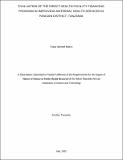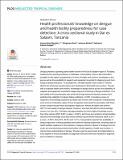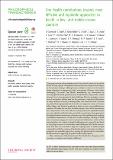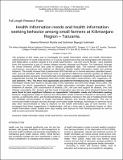Evaluation of the direct health facility financing program in improving maternal health services in Pangani district, Tanzania
Abstract
Maternal morbidity and mortality remain significant public health concerns globally, with
Tanzania reporting 524 deaths per 100 000 live births annually in 2022. While national level data
provide some insights into the issue, a focus on sub-national levels is required because of
differences in contexts such as rural-urban disparities in maternal mortality. This study examined
Direct Health Facility Financing (DHFF) and its effects on the quality of maternal health services
in Pangani, a rural district in Tanzania. The study used qualitative and quantitative methods.
Direct disbursement of funds from the central government through the Ministry of Finance and
Planning to the primary health facilities reduced delays in procurement, improved community
outreach services, and improved community leaders’ engagements. Deliveries occurring at health
facilities increased by 33.6% (p<0.001) one year after the DHFF implementation. Various
medicines, delivery kits, and some reagents increased significantly (p<0.05). However,
unavailability of computers and poor internet connectivity, insufficient supply of medical
equipment and stock out at Medical Stores Department increased the difficulty of obtaining the
missed items from the selected prime vendor. Overall, this study shows a positive impact of the
DHFF on maternal health service delivery in Pangani district. Specifically, increase in the number
of medical supplies, equipment, and reagents necessary to provide maternal health services
contributed to the observed increase in facility deliveries by a third. Moreover, the system
minimizes unnecessary delays in the procurement processes of required drugs, supplies, and other
facility reagents. To maximize the impact of the DHFF system, unavailability of computers,
unstable internet, limited knowledge of the staff about the system, and inadequate health
workforce should be addressed. Furthermore, training could include refreshers models on DHFF
implementation.
Collections
Related items
Showing items related by title, author, creator and subject.
-
Health professionals’ knowledge on dengue and health facility preparedness for case detection: A cross-sectional study in Dar es Salaam, TanzaniaHealth professionals’ knowledge on dengue and health facility preparedness for case detection: A cross-sectional study in Dar es Salaam, Tanzania
Mustafa, Ummul-khair; Sauli, Elingarami; Brinkel, Johanna; Kreppel, Katharina (PLOS, 2023-11-21)Dengue presents a growing public health concern in the Dar es Salaam region of Tanzania, marked by the recurring incidence of outbreaks. Unfortunately, there is little information available on the region’s preparedness in ... -
One Health contributions towards more effective and equitable approaches to health in low- and middle-income countries
Cleaveland, Sarah; Sharp, Jo; Abela-Ridder, Bernadette; Allan, Kathryn; Buza, Joram; Crump, John; Davis, Adrian; Del Rio Vilas, Victor; de Glanville, William; Kazwala, Rudovick; Kibona, Tito; Lankester, Felix; Lugelo, Ahmed; Mmbaga, Blandina; Rubach, Matthew; Swai, Senyael; Waldman, Linda; Haydon, Daniel; Hampson, Katie; Halliday, Jo (Published by the Royal Society, 2017)Emerging zoonoses with pandemic potential are a stated priority for the global health security agenda, but endemic zoonoses also have a major societal impact in low-resource settings. Although many endemic zoonoses can ... -
Health Information needs and health information seeking behavior among small farmers at Kilimanjaro Region – Tanzania.
Mosha, Neema; Sulemani, Solomon Bayugo (Scholarly Journal of Medicine, 2012-08)The purpose of this study was to investigate the health information needs and health information seeking behavior of small scale farmers. In a survey questionnaire that was triangulated with interviews and observation, ...




